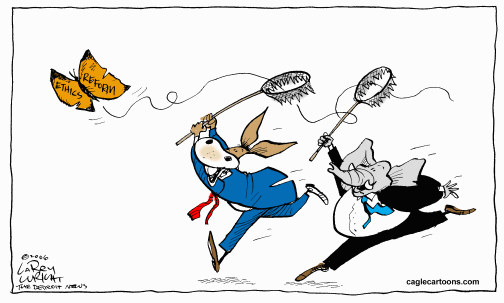 By DAN K. THOMASSON Scripps Howard News Service January 22, 2007
With both the House and Senate having passed versions of ethics reforms and with differences to be worked out by a conference committee, the intention to curtail in some small degree the activity of lobbyists seems genuine. The stimulus, of course, was the scandal precipitated by the so-called K Street crowd led by the notorious Jack Abramoff, the latest corrupter of congressional morals. In truth Abramoff was more a facilitator than a debaucher, merely offering his wide circle of acquaintances an opportunity several found too enticing to resist.  Chasing ethics reform Artist Larry Wright, The Detroit News Distributed to subscribers for publication by Cagle Cartoons, Inc.
The current pay of $168,500, up from $165,200 last year, may sound like a lot but considering the responsibilities and the costs of maintaining the job, that amount is woefully short of assuring us the best quality of representation. Furthermore, the impact on the other two branches whose pay requires congressional action is enormous. Many of the nation's best legal minds have opted out of consideration for a court appointment simply because they couldn't afford the honor. Service is fine but it simply doesn't pay the bills when there are families to feed and educate. The late Justice Abraham Fortas once explained that he didn't pay much attention to his income taxes because he no longer earned enough money to worry about it. His concern over what he considered a paltry sum led him to accept outside gratuities and ultimately forced his resignation from the Supreme Court. The late chief justice of the United States, William Rehnquist, long argued that low salaries had a debilitating effect on the quality of the federal bench from top to bottom. He lobbied for higher pay. A veteran Congress watcher observed recently that the salaries attracted two kinds of individuals to the job, the already quite rich and the crazies with causes. That may be a bit extreme, but there certainly is evidence that many desirable candidates forgo the experience because of both the high cost of campaigning and the relatively low pay, particularly those who are earning far more outside of public office. The hardship is probably more prevalent in the House where two-year terms mean almost perpetual campaigning. Those "lucky" enough to be elected must face any number of financial demands. Lawmakers, again especially in the House, frequently maintain two households, one in Washington and the other in the district where spouses raise their families under more normal circumstances. This often forces the lawmakers to double or triple up in their Washington accommodations to save money. In one case, three lawmakers live in a house owned by a House member with a senator sleeping on a mattress in the front room. So is it any wonder that the lawmakers are vulnerable to those who would wine and dine them and provide them with entertainment packages they couldn't afford otherwise? The wonder is that more of them don't succumb to the temptations. Obviously, raising pay to the level of the enormous responsibility demanded by the job wouldn't be an absolute deterrent to congressional corruption. But, along with other meaningful reforms, and stricter campaign funding laws, it certainly would make it easier for members to avoid the financial pitfalls that dot this town from 1600 Pennsylvania Ave. to Capitol Hill. In fact, when one considers that the president of the largest corporation in the world - the United States - earns a paltry sum each year, the system provokes constant ethical challenges before and even after service when many ex-lawmakers try to make up for lost time by lobbying. Salaries of $300,000 annually for congressmen and judges would be a start and the president of the United States should be paid at least $l million for equity's sake alone. Relieving the pressures and attracting better hands just might make a difference in good government.
Distributed to subscribers for publication by Scripps Howard News Service, http://www.scrippsnews.com
|